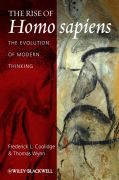
The rise of Homo Sapiens: the evolution of modern thinking
Coolidge, Frederick L.
Wynn, Thomas
The Rise of Homo Sapiens: The Evolution of Human Thinking presents a provocative theory about the evolution of the modern mind based on archaeological evidence and the working memory model of experimental psychologist Alan Baddeley. The book explains the mystery of the disappearance of the Neandertals and the ascendancy of modern Homo sapiens - and whether this was at the expense of theNeandertals. The Rise of Homo Sapiens has been written to introduce scientists and students to the fascinating interface between the worlds of archaeology and cognitive science, and argues that the evolution of modern thinking occurred in two major leaps; the advent of Homo erectus over 1.5 million years ago, and a final enhancement of working memory capacity sometime within the last 200,000 years. The authors argue that highly ritualized burials, personal ornaments, cave art and highly creative figurines, and age and gender divisions of economic labor, all of which were characteristic of Homo sapiens about 30,000 years ago, were clearly products of their cognitive functions, e.g., central executive functions. Neandertals, living at the same time, had virtually none ofthese cultural products despite larger brains! This is the first book to explain elaborately how thinking differences between Homo sapiens and Neandertals may have accounted for the ultimate demise of Neandertals. Cognitive archaeology is a quickly growing discipline yet archaeologists have been slow to adopt current theories, models, and findings within contemporary cognitive science. The Rise of Homo Sapiens will serve as a unique introduction and primer into both disciplines."
- ISBN: 978-1-4051-5253-2
- Editorial: Wiley-Blackwell
- Encuadernacion: Cartoné
- Páginas: 320
- Fecha Publicación: 27/03/2009
- Nº Volúmenes: 1
- Idioma: Inglés
